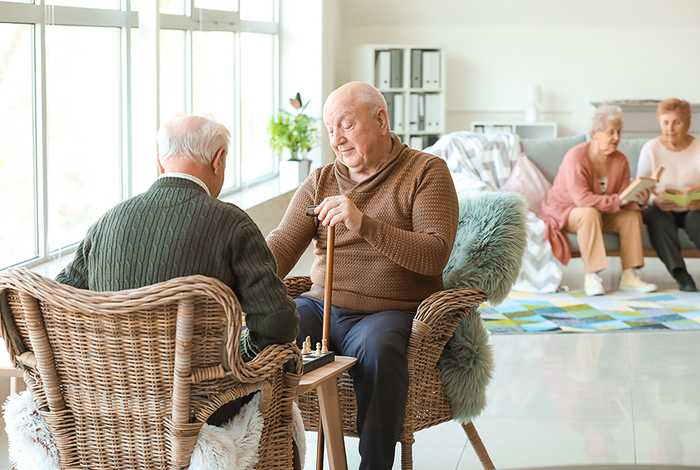Posted by Hannah Rowe
Discharge to Assess - Demystifying Care Terminology
Continuing our series taking the mystery out of social care terminology, in this blog we discuss ‘Discharge to Assess’ or ‘D2A’.
If you or a loved one has had a period in hospital, perhaps as the result of an illness or accident, you will no doubt be very keen to return to your own home. However, although you or they may no longer require a hospital stay for clinical reasons, medical staff may feel that it is not safe for you to return home unsupported. This is where you may hear them speak about ‘Discharge to Assess’ or ‘D2A’. What is it, and how can it help people regain their independence?
In this blog you'll learn:
What is ‘Discharge to Assess’?
Discharge to Assess or D2A is a type of short-term care package used to bridge the gap between being in hospital and either regaining independence at home or moving to a care facility long-term. The patient is discharged from hospital, either to a care home or to their own home with community care staff visiting, and is supported to regain as much independence as possible. During this period, their progress is assessed to determine how independent they are capable of being in the future, and therefore where they will be able to live after the Discharge to Assess package comes to an end. In different areas and in previous years this service (or a similar one) has also been known as ‘home first’, and ‘step down’.
This package of care and support is funded by the local authority and lasts for 4-6 weeks.
There are four Discharge to Assess pathways, the ones where support may be required are:
- Pathway 2 – Returning home with support from health and social care professionals (called ‘reablement’)
- Pathway 3 – A short-term placement in a care facility for rehabilitation
- Pathway 4 – Ongoing 24-hour care in a care or nursing home.
What happens during the 6 weeks?
When someone comes home following a stay in hospital it can take them a little while to regain mobility and confidence. It is important that they have the time to do this, and that ongoing assessment of their progress and long-term needs is done in their ‘normal’ environment rather than in an unfamiliar setting such as a hospital ward.
When Discharge to Assess support is agreed, the medical professionals involved in the patient’s care will agree with them and their care team a set of ‘aims’ for the person to reach. This could be, for example, them being able to prepare lunch, and wash and dress themselves. Every person’s aims will be different. During the Discharge to Assess visits, the care staff will be observing and encouraging the person to meet these aims in a safe manner, and will record their observations.
The care provider chosen to make these visits will often have a specialist team who only work with Discharge to Assess clients, and therefore have a deeper understanding of the person’s needs and how they can best support them to achieve their goals.

What happens at the end of the 6 week period?
At the end of the 6 weeks (or earlier) the patient will be assessed to determine their progress towards the agreed aims. At this stage it may be decided that further support is required, or that the patient has met the identified aims and therefore support can be withdrawn. In the latter scenario, if the patient or their family decide that they would like support to continue then this will probably have to be self-funded.
Why is Discharge to Assess important?
Often, although a patient is medically fit to be discharged from hospital it is not possible for them to return home. This can be for a variety of reasons, many of which are related to the person’s living arrangements – for example, if they live alone or have no mobility aids in their property, or no-one to support their recovery.
In this instance, they remain in hospital in a situation referred to as ‘bed blocking’. Not only is this bad for the NHS, which will experience a shortage of beds for people who need them; but it can also have a significant negative effect on the patients. The National Audit Office has estimated that 10 days of bed rest for healthy older people can equate to 10 years of muscle ageing, alongside loss of function. In addition, spending time in hospital puts patients at a greater risk of developing an infection which can lead to further health complications.
It has long been understood that we have an ageing population, therefore keeping people well for as long as possible is vitally important. As we age we become more frail, and hospital admissions become more likely. Keeping these hospital stays as short as possible, and discharging patients with support such as Discharge to Assess to prevent a recurrence, is therefore an important strategy for healthcare.
Discharge to Assess in devolved nations
The NHS Scotland and NHS NI models are also called Discharge to Assess, and work in a similar way to the NHS England system. In Wales, the system is slightly different. Known as ‘Discharge to Recovery then Assess’ it is built on the NHS England system, but includes a period where a patient can recover at home before their ongoing needs are assessed.
What if I am funding my own care?
If you are in a hospital bed but know you will eventually be funding your own care you don’t have to go through the Discharge to Assess process – you can take proactive steps to find your own care provision going forwards.
Autumna can help you find home care and live-in care services throughout the UK as well as care homes and assisted living developments simply by completing this short questionnaire.
Alternatively call our advice line team who will be happy to help you with your next steps in finding the right onward care for you or your loved one. The number is 01892 335 330 and the line is open 7 days a week (Monday – Friday 8.30am – 5.30pm, Saturday 10am – 5pm and Sunday 10am – 4pm).
Receive a Free Care Provider Shortlist!
Let our expert team of advisers get your search off to a great start.
Tell us a little about your needs and we'll send you a bespoke shortlist of care providers! Click the button below to begin, it takes just a few minutes.
Other articles to read
Autumna Blog

Older Persons Care Advice
Annuities for care home fees: Everything you need to know
October 23rd, 2025
Learn how annuities for care home fees provide guaranteed income, financial stability, and peace of mind when planning for long-term care costs.

Older Persons Care Advice
Care options for the elderly: What is right for you?
October 17th, 2025
Discover care options for the elderly that fit your needs, from home support to residential care, helping you plan confidently for the years ahead.

Older Persons Care Advice
Are next of kin responsible for care home fees
October 17th, 2025
Find out the truth about care costs. Are next of kin responsible for paying care home fees? Learn who pays, exceptions, and how to plan ahead.
Frequently Asked Questions
Discharge to Assess or D2A is a type of short-term care package used to bridge the gap between being in hospital and either regaining independence at home or moving to a care facility long-term.
Discharge to Assess (D2A) is important because it allows patients to leave the hospital when they are medically fit to do so, even if they require further support in the community or care setting. This can free up hospital beds for patients who need them more urgently, and it can also improve outcomes for patients by reducing the risk of developing further health complications whilst in hospital.






